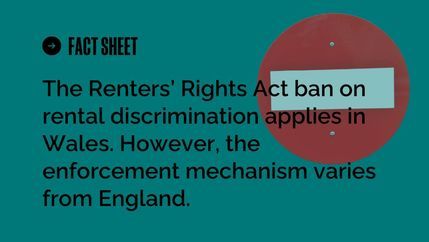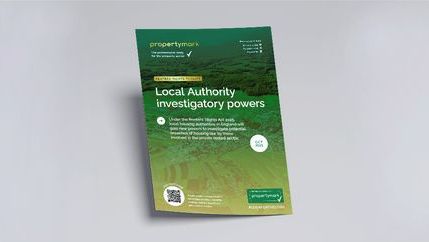London’s pressure points loom large in Renters’ Rights planning
Our response to the London Assembly Housing Committee’s call for evidence highlights that the success of rental reform in London will depend not only on legislative change, but on whether court capacity, enforcement structures, and market realities are aligned to support it, a position that was echoed by a panel of industry experts in a live evidence session in City Hall on 9 February 2026.
Propertymark network helps agents prepare for Renters’ Rights transition
Experts Brian Moran, Advisory Panel Member (Scotland) and Angela Davey, Advisory Panel Member and Regional Executive (Wales), who have first hand experience of similar reforms to the Renters’ Rights Act, shared practical lessons in our webinar with a core message of reassurance. Practical lessons on how Scotland and Wales have managed, on what does and doesn’t work, and where agents should focus their efforts now were imparted, as well as emphasising how essential early preparation, good communication, and robust processes are, so that letting agents can continue to support landlords and tenants while adapting to the new regulatory landscape.
Draft Written Statement Terms issued with clarification sought by Propertymark on some specifics
The Assured Tenancies (Private Rented Sector) (Written Statement of Terms, etc. and Information Sheet) (England) Regulations 2026 have been published in draft by the UK Government. We have engaged with the Ministry for Housing, Communities and Local Government (MHCLG) to provide feedback on the regulations, which currently fail to acknowledge common real-world scenarios, such as overseas property owners and unique arrangements for vulnerable tenants or tenants with a disability.
Fact Sheet: Discrimination in the rental market (Wales)
On 1 May 2026, the Renters’ Rights Act 2025 will come into force, introducing new measures to tackle rental discrimination. Following confirmation from the UK and Welsh Governments, these provisions will commence in Wales on 1 June 2026, making it unlawful for letting agents and landlords to discriminate against prospective contract holders because they have children or receive benefits.
National survey data reveals shift in landlord business models
The private rented sector (PRS) is being reshaped by changing motivations and new financial pressures, which help explain the structural changes behind shrinking stock levels, higher churn, and new expectations around compliance and profitability. For agents, these insights help develop and position services to effectively address the needs of their clients in a shifting market.
Reform, regulation, and regeneration: shaping the property sector in 2025
Propertymark has worked tirelessly to ensure members’ voices are heard, practical concerns are addressed, and reforms are workable as the UK and devolved governments have pushed ahead with major legislative changes. Long-standing challenges around supply, affordability and standards have remained firmly in focus, and we will continue to scrutinise legislation, challenge unclear proposals and provide practical guidance to support members as reforms move from policy into practice across the UK.
Guide to Local Authority Investigatory Powers
From 27 December 2025, local housing authorities in England will have powers to investigate potential breaches of housing law by landlords, agents, and others involved in the private rented sector, allowing them to request information, seize documents, and enter business premises under certain circumstances.
1 May is the date for tenancy reforms under the Renters’ Rights Act
The UK Government has confirmed that the first phase of reforms will take effect on 1 May 2026, marking the most significant shift to tenancy law in a generation. From this date, all existing and new private tenancies in England will move onto the new system. Propertymark has consistently pressed for sufficient lead-in time to allow agents and landlords to prepare. With a firm date now announced, the sector can begin making practical plans.
Better housing standards depend on clarity and consistency from Ministers
Timothy Douglas, Propertymark’s Head of Policy and Campaigns, took the views and concerns of members directly to MPs as he gave evidence to the Housing, Communities and Local Government Committee inquiry into housing conditions in England on 4 November 2025. Douglas highlighted the ongoing work of professional agents in driving up standards but warned that progress under the Renters’ Rights Act 2025 depends on clarity from the UK Government, realistic timelines, and a fair regulatory framework.
First Renters’ Rights Act changes commence on 27 December 2025
The Act equips Local Housing Authorities (LHAs) with stronger rights to investigate whether a landlord or letting agent has breached certain housing laws – measures which apply to letting of private rented accommodation, and actions that may involve illegal eviction, poor standards, and non-compliance.
Agents must seize this moment to shine as Renters’ Rights Act clears parliament
The legislation gained Royal Assent on 27 October 2025. Implementation will be staged via secondary legislation, and the UK Government has stated it will allow time for a smooth transition and engage the sector on commencement dates. Propertymark has hit the ground running, with training, events, and downloadable resources to support the sector through the most significant transition in private renting for a generation.
Rental reforms soon to receive Royal Assent
On 8 September 2025, MPs debated the Renters’ Rights Bill as it returned to the House of Commons for the Ping-Pong Stage — when amendments made by the House of Lords are considered. This was a crucial step in determining whether the Bill will pass to Royal Assent before the end of the year. The Commons reviewed and responded to a series of amendments, many of which reflected concerns raised by industry and campaigners. While some technical changes were accepted, the UK Government signalled its determination to press ahead with the central reforms.
Renters’ Rights Bill: transforming how student lettings operate
For agents in England working with landlords in this specialist market, it is vital to understand the changes, the risks, and the opportunities ahead. Propertymark has been campaigning hard to ensure student housing is not undermined by reforms designed for the wider private rented sector (PRS). The loss of fixed terms is the single biggest risk for this market, and we continue to fight for workable solutions that protect the annual student lettings cycle.
Renters' Rights Act 2025 Toolkit
The toolkit breaks down the Act and helps you to inform your landlords and tenants. It includes guidance, training, fact sheets, FAQs, and resources to help you prepare for the changes.
Renters’ Rights Bill – key decisions to watch during the final stages
The Bill may face further amendments before final approval, which must be agreed to by both the Commons and the Lords. This process begins on 8 September, when the legislation could bounce between the two as the fine details are hammered out. For agents working to adapt, it’s a confusing time – so we’ve pulled together a round-up of the reforms, highlighting the areas that are still under discussion.
Proposed licensing schemes risk duplication and higher costs for compliant landlords
Hackney Council is consulting on plans to introduce two new five-year licensing schemes in the private rented sector (PRS) from early 2026, arguing that they will improve standards. Propertymark supports the aim of raising housing standards, but we strongly urge Hackney and other local authorities to rethink their approach. A healthy PRS is fundamental to meeting growing housing demand, and under-resourced licensing schemes too often end up penalising good landlords and agents while allowing poor practice to persist.















